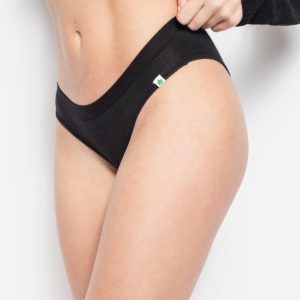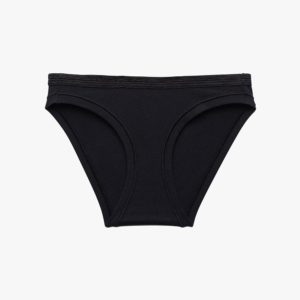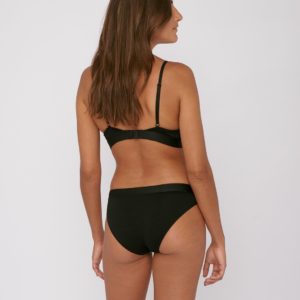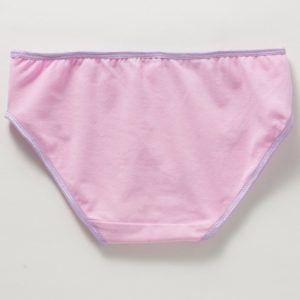Table of Contents

Our top pick

Third pick
You might not give much thought to your underwear, but your choice of intimates will have an impact on the planet.
Many of us are guilty of indulging in fast fashion lingerie brands, which often means each pair lasts just a few wash cycles before wearing out and getting tossed aside. This leads to a significant waste problem, as underwear is rarely recycled and usually can’t be donated for sanitary reasons.
Compounding the problem, most commercial underwear is produced with potentially toxic softeners, bleaches, dyes, and other compounds that can act as carcinogens. Many contain plastic fibers that take thousands of years to break down or, worse, become microplastics that contaminate our soil and water systems.
Some brands are fighting these trends by selling sustainable alternatives like organic underwear. Most are made from durable materials grown without pesticides, and they contain less synthetic materials than standard pairs.
However, not all organic underwear brands are equal. Here are our top five picks for the best organic women’s underwear and the facts you need to know before buying.
Curious about how we rate products? Click here to view our methodology, which at its core, is about voting with our dollars to fight climate change.

Best Organic Women’s Underwear: WAMA Underwear
Highlights: Made from a blend of hemp and cotton fibers, Wama underwear is attractively priced and should hold up to heavy use.
- Underwear Pricing: $18-$20
- Bra Pricing: $38
- Primary Materials: hemp, organic cotton, spandex
- Collection Size: two bras, five underwear styles
Wama brand apparel has made a name for itself by relying on a somewhat unconventional clothing material—hemp. Considered to be the world’s strongest natural fiber, hemp is naturally anti-bacterial (and consequently anti-odor), holds onto dye better than cotton, and won’t break down in sunlight. This durable material softens the more you wash it, and it wicks away moisture for extra breathability and comfort.
Hemp production is also lighter on the planet than standard textiles. The plants grow fast, don’t need pesticides or herbicides, and require half as much water as cotton crops. Best of all, the hemp plant’s deep roots pull nutrients to the soil surface and actively improve it over time.
Most Wama products are made from a fabric blend of 53% hemp, 44% GOTS-certified organic cotton, and 3% spandex. While Wama’s hemp isn’t certified, the company claims it is grown organically on small family farms in China. These other materials complement hemp’s strength and durability by adding more softness and stretchiness to the underwear. Unfortunately, from a sustainability perspective, spandex is a petroleum-based, non-biodegradable compound.
Even so, the company has an impressive track record for the environment. Wama brand certifications include Peta-Approved Vegan, Green America Certified Business, Member of the National Hemp Association, and the Business Social Compliance Initiative.

Organic Basics
Highlights: This brand’s variety of styles and fabrics earns it second place on our list, and its support of regenerative cotton growing practices make a strong stand for the environment. Just note most items include spandex or other synthetic materials.
- Underwear Pricing: $39-$55 (sold in two-packs)
- Bra Pricing: $44-$75
- Primary Materials: organic cotton, TENCEL, Recycled nylon with Polygiene® treatment
- Collection Size: 30+ bras, 9+ underwear styles
Organic Basics specializes in underwear, though it also sells T-shirts, sweaters, socks, and activewear. Every item is made from Class A or B fibers, and the company uses GOTS certified cotton grown along the Aegean Sea- cotton considered come of the softness and most durable available.
The brand also stands out for its use of TENCEL fibers and recycled nylon, much of which is treated with a recycled silver salt called Polygiene®. This material purportedly keeps clothes smelling fresher longer—saving energy by reducing how often you must wash them—and is found within the Organic Basic’s SilverTech™ product line.
Claiming to only work with trusted, certified factory partners, Organic Basics is taking steps to improve the transparency of its product line. To date, the company’s Impact Report claims it has kept almost 2.5 tons of material out of landfills compared to following traditional practices.
Apparel-wise, Organic Basics earns rave reviews from customers. Many praise its diverse product line, comfortable fit, cute cuts, and variety of colors.
Organic Basics also supports cotton farmers who want to move towards regenerative growing practices by donating varying percentages of its profits to projects that sequester carbon and promote soil health. Its goal is to convert 30,000m2 of conventional cotton farmland to regenerative practices.

Knickey
Highlights: Knickey’s low pricing makes this organic underwear brand attractive for many customers. The lack of bras and relatively minimal underwear style options may be a detractor, though.
- Underwear Pricing: $13
- Bra Pricing: N/A
- Primary Materials: GOTS certified cotton, elastane
- Collection Size: Five underwear styles
Knickey is a female-founded company that offers a range of women’s organic cotton underwear in sizes XS-XL. The brand puts the focus on breathability by advertising that its underwear can reduce your risk of developing yeast infections and keeps you from exposing your system to toxic carcinogens.
As with many of the brands here, Knickey underwear is made from 95% GOTS certified cotton and 5% elastane. Each pair is dyed with Oeko-Tex certified dyes, which purported keeps potentially toxic compounds like chlorine, bleach, and formaldehyde out of the production process. However, elastane, which is a generic term for spandex, isn’t nearly as eco-friendly. It’s a petroleum-based polymer that won’t break down at the end of your underwear’s lifespan.
One way the brand stands out is its recycling program. Knickey has partnered with an NYC nonprofit to recycle used intimate apparel and divert it from landfills. You can send your used underwear to the company (any brand) through a pre-paid shipping label. The items will get new lives as secondary textiles where they could be used as house insulation, mattress batting, and more.
All Knickey underwear ships in plastic-free packaging made of recycled materials and biodegradable adhesives.

Brook There
Highlights: Brook There offers an extensive collection of intimates crafted from silk and organic cotton in various colors. It falls on our sustainability ranking because of the higher concentration of spandex in the fabric.
- Underwear Pricing: $14-$61
- Bra Pricing: $28-$56
- Primary Materials: Organic cotton, spandex, silk
- Collection Size: 20+ bras, 30+ styles of underwear
Brook There produces organic underwear, bras, and other forms of intimate apparel within its Portland, Maine factory. The brand focuses on sustainable materials like organic cotton and silk for every piece for an emphasis on comfort and breathability. Though it adopts a minimalist aesthetic, Brook There offers more colors and underwear styles than any other company mentioned here.
Each piece by Brook There is designed for durability and a comfortable fit, and most bras support sizes A through C cups. Each piece is made from fabric that is milled and dyed in California and breaks down to 94% GOTS-certified organic cotton and 6% spandex. But as mentioned above, spandex isn’t great for the environment as it’s made from nonrenewable materials and won’t break down.
Despite this, Brook There makes our list of best organic women’s underwear for its diverse collection and overwhelmingly positive reviews. Women rave that these bras offer a comfortable yet sturdy design that pairs well with most outfits and that each item holds up well through lots of washing.
What To Look for When Purchasing Organic Underwear
When considering organic underwear options, a few details deserve some thought.
First, pay attention to the material used within each pair. Most will contain organic cotton, which is prized for being a soft, breathable, and durable fiber. Others may include bamboo, hemp, or TENCEL—a patented form of rayon that’s easier on the environment.
However, most brands will pair these natural fibers with something less sustainable, such as spandex. While this synthetic material can improve your underwear’s comfort and stretchiness, it means the underwear isn’t 100% organic and consequently won’t break down the same way that all-natural textiles will.
Beyond organic certification, there are other labels to pay attention to when purchasing sustainable underwear for women. Here are two worth knowing.
- GOTS-Certification: The Global Organic Textile Standard (GOTS) is a leading processing standard for all textiles made from organic materials and requires farms that supply them to show proof of organic certification.
- Standard 100 by OEKO-TEX: This certification means that the textiles within a product tested negative for traces of more than 100 potentially harmful compounds.
Another idea might be to review women’s health products, like period underwear, period cups, etc
C, we do that here: https://www.leafscore.com/eco-friendly-bath-products/non-toxic-menstrual-products/